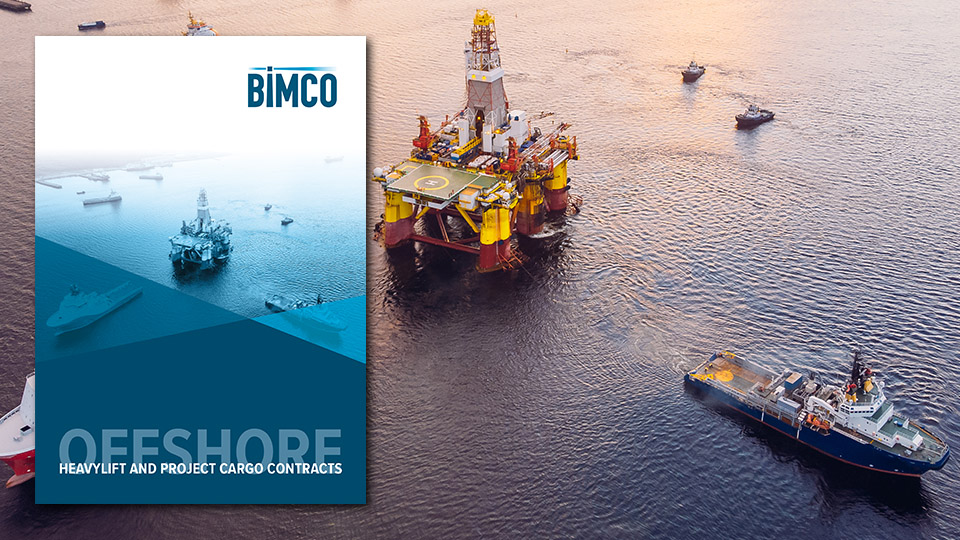LNG Fuel Gas-freeing and Cool-down Clause
Overview
In 2021 BIMCO initiated a project to develop a suite of LNG fuel clauses for time charter parties. The number of LNG fuelled ships in operation is growing steadily and the suite reflects the need to have bespoke clauses in time charters for these ships.
The LNG clauses cover matters related to the LNG quality, delivery/redelivery, gas-freeing and cooling down and an operational clause. For dual-fuel ships the clauses are intended to be used together with the existing BIMCO bunker clauses for conventional fuel oils.
The current suite of LNG fuel clauses for use in time charter parties also consists of:
LNG Bunker Operational Clause for Time Charter Parties
LNG Fuel Quality ClauseLNG Fuel Gas-freeing and Cool-down Clause
BACKGROUND
LNG fuelled ships may need to gas-free their tanks from time to time. Since this is a special requirement for LNG fuelled ships, a bespoke clause has been developed. Gas-freeing is not a common operation and is needed only under certain circumstances such as inspection, dry-docking or survey.
BIMCO LNG Fuel Gas-freeing and Cool-down Clause for Time Charter Parties
(a) If the Vessel is required to gas-free her LNG fuel tank(s) for any purposes (including without limitation for inspection, surveying, drydocking, maintenance or repair) then subject to reasonable prior notice being given by the Owners to the Charterers, the Charterers shall accommodate any requests from the Owners for the quantities:
(i) of LNG fuel remaining onboard to be consumed and/or, if more than one LNG fuel tank, consolidated; and
(ii) of LNG fuel (and any other fuel, if applicable) to be delivered to the Vessel to be adjusted,
such that the Vessel shall have sufficient fuel to allow it safely to reach the place of such inspection, survey, drydocking, maintenance or repair, with all pumpable quantities of LNG fuel consumed (or consolidated if applicable) prior to arrival at such place.
(b) Provided that the requirement to gas-free and/or inert the Vessel’s LNG fuel tank(s) does not arise from or in connection with either the orders of or any breach of the Charter by the Charterers:
(i) the expense of any inerting and/or gas-freeing of the LNG fuel tank(s) and any LNG fuel consumed or otherwise lost for the purpose of such inerting and/or gas-freeing shall be for the Owners’ account; and
(ii) if the Vessel is then returned to the Charterers’ service with LNG fuel tank(s) not gassed-up and cooled-down, the Vessel shall be off-hire during any time lost by gassing-up and cooling-down the LNG fuel tank(s) ready to load LNG fuel at the next loading of LNG fuel.
(c) If the requirement to inert and/or gas-free the Vessel’s LNG fuel tank(s) arises from or in connection with either the orders of or any breach of the Charter by the Charterers, the expenses described in (b)(i) above shall be for the Charterers’ account and the Vessel shall not be off-hire under (b)(ii) above.
(d) If at any time during the term of the Charter the Vessel is required to gas-up or cool-down its LNG fuel tank(s), Charterers shall provide any LNG fuel and inert gas needed for such purposes. Such LNG fuel and inert gas shall be for Charterers’ account except where the need arises:
(i) in the circumstances in (b)(ii) above; or
(ii) as a result of a breach of the Charter by and/or fault on the part of the Owners that prevented the Vessel from conducting LNG bunkering operations when required by Charterers to do so,
in which case such LNG fuel and inert gas shall be for Owners’ account.
Drafting team
The BIMCO suite of LNG Fuel clauses has been developed with the invaluable assistance of owners, charterers, P&I clubs and legal experts. BIMCO is extremely grateful to the following individuals for working with us and their dedication to the project:
Ms Camilla Nyhus-Møller, Höegh LNG (Chairperson)
Gerben Dijkstra, Anthony Veder
Captain Iain Scally, NYK
Mr Chris Meyer, BHP
Ms Sarah Jane Thompson, BHP
Ms Charlotte Vandeville, Affinity
Mr Jonathan Gaylor, Affinity
Mr Michael Bird, Britannia
Mr Marcus Dodds, Watson Farley & Williams
BIMCO secretariat support was provided by Grant Hunter, Head of Contracts & Clauses and Nina Stuhrmann, Manager, Contracts & Clauses.
Explanatory notes
Guidance Notes
The following guidance notes are intended to provide some background to the thinking behind the BIMCO LNG Fuel Quality Clause for Time Charter Parties. These notes explain the scope of each provision and clarify how the clause is intended to operate and the way it allocates risk between the parties. If you have any questions about the clause that we have not answered in these notes, please contact us at contracts@bimco.org and we will be happy to assist.
Subclause (a) – This subclause gives the owners the option to gas-free the tanks and states the procedure to be used. The LNG fuel tanks need to be empty before they can be gas-freed. This can be achieved by either consuming the fuel or consolidating it into other tanks.
The owners should give “reasonable notice” to the charterer which will be different from ship type and also the terms of the charter party.
If the owners want to consolidate the LNG fuel on board into another tank, they must first obtain charterers’ permission.
Subclause (b) allocates the costs for gas-freeing or inerting the tanks to the owners unless the requirement has been caused by the charterers or has been ordered by them. The ship will be off-hire if it is returned to the charterers with tanks not gassed-up and cooled-down and therefore not ready to load LNG fuel.
Subclause (c) is self-explanatory.
Subclause (d) deals with situations when the ship needs to gas-up or cool-down the tanks during the ordinary operation of the charter party.
Related Help & Advice
Create or edit a contract
The one-stop digital shop for all the standard maritime contracts and clauses you’ll ever need.
Latest Related News
-
BIMCO adopts portfolio of four ETS clauses
The shipping industry is facing an increase in new regulations from the International Maritime Organization (IMO) and the European Union (EU) and an increase in the urgency to decarbonise. To support the industry, BIMCO has developed a portfolio of new emission trading scheme (ETS) clauses.
-
BIMCO adopts new CII clause for Voyage Charter Parties
The shipping industry is facing an increase in new regulations from the International Maritime Organization (IMO) and the European Union (EU) and an increase in the urgency to decarbonise. To support the industry, BIMCO has developed a new CII Clause for Voyage Charter Parties. The clause was adopted by BIMCO’s Documentary Committee on 11 October and is the latest addition to BIMCO’s portfolio of carbon clauses.
-
BIMCO’s CII clause adopted
The BIMCO Documentary Committee has adopted a CII Operations Clause for Time Charter Parties which will help the industry commercially navigate the complexities of the new CII regulations from the International Maritime Organization (IMO).
-
Fumigation
BIMCO providing information and guidance relating to fumigation of cargoes that are shipped under the IMSBC Code, the Grain Code and the IMDG Code.
-
BIMCO publishes EEXI Transition Clause ahead of IMO efficiency regulation
New regulation from the International Maritime Organization (IMO), which will require existing ships to reduce carbon emissions, is due to enter into force in just under one year. As compliance will benefit to a large extent from co-operation between shipowners and charterers, BIMCO has developed a new clause to address the changes.
ELSEWHERE ON BIMCO
Holiday calendar
BIMCO's Holiday Calendar covers general holidays in over 150 countries, plus local holidays and working hours in more than 680 ports around the world.
Learn about your cargo
For general guidance and information on cargo-related queries.




